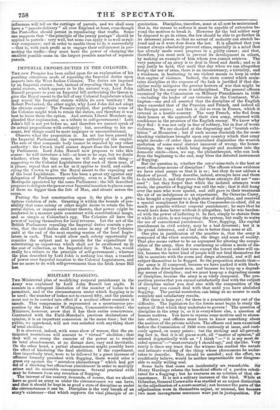IMPERIAL IMPORT-DUTIES IN THE COLONIES.
THE new Premier has been called upon for an explanation of his puzzling circuitous mode of repealing the Imperial duties upon Imports into the West Indian Colonies. The duties are imposed by an Imperial statute; but, instead of repealing them by an Im- perial statute, which appears to be the natural way, Lord John Russell proposes to pass an Imperial bill authorizing the Queen to give the Royal assent to the bill of any Colonial Legislature which may repeal the Imperial statute within its own territory! Sir Robert Peel asked, the other night, why Lord John did not adopt the obvious course? The Premier replied, that perhaps some of the Colonies might wish to retain the duties' and therefore it was best to leave them the option. And certain Liberal Members ap- plauded that explanation, as a tribute to self-government ! Lord John's bill is not yet before us, and therefore we cannot speak of its actual propositions with certainty; but, according to his ac- count, few things could be more improper or unconstitutional. THE new Premier has been called upon for an explanation of his puzzling circuitous mode of repealing the Imperial duties upon Imports into the West Indian Colonies. The duties are imposed by an Imperial statute; but, instead of repealing them by an Im- perial statute, which appears to be the natural way, Lord John Russell proposes to pass an Imperial bill authorizing the Queen to give the Royal assent to the bill of any Colonial Legislature which may repeal the Imperial statute within its own territory! Sir Robert Peel asked, the other night, why Lord John did not adopt the obvious course? The Premier replied, that perhaps some of the Colonies might wish to retain the duties' and therefore it was best to leave them the option. And certain Liberal Members ap- plauded that explanation, as a tribute to self-government ! Lord John's bill is not yet before us, and therefore we cannot speak of its actual propositions with certainty; but, according to his ac- count, few things could be more improper or unconstitutional. Observe what the proposition is. An act has been passed by the Imperial Parliament, the supreme authority of the empire. The acts of that composite body cannot be repealed by any other authority : the Crown itself cannot depart from the law decreed by Parliament. Lord John Russell now proposes to take this course : he will introduce a bill—at least so he says, but we doubt whether, when the time comes, he will do any such thing— suggesting to the Colonial Legislatures that each of them may, if it please, repeal that act so far as it applies to itself, and autho- rizing the Crown to give the Royal assent to the repealing act of the local Legislature. There has been a great cry against any delegation of Parliamentary authority, even to a Board in the Metropolis appointed by the same Parliament : the bill described proposes to delegate the power over Imperial taxation to places some of them no bigger than the Isle of Man, and situate across the ocean.
Putting the best construction upon it, the plan is a gra- tuitous violation of rule. Granting it within the bounds of pos- sibility that some colony or other might desire to retain the Im- perial duties, or imposts equivalent thereto, that power might be conferred in a manner quite consistent with constitutional usage, and as simple as Columbus's egg. The Colonies all have the power of taxing themselves for local revenue. Let the act of the British Parliament repealing the Imperial duties contain a pro- viso that the said duties shall not cease in any of the Colonies until at the end of the next ensuing session of the local Legis- lature in each. That would allow each colony opportunity to consider the subject and to provide for the expenditure by substituting an import-tax which shall not be swallowed up in the cost of collection, as the Imperial duty is. That, too, would really be a tribute to the principle of self-government ; whereas the plan described by Lord John is nothing less than a transfer of power over Imperial taxation to the Colonial Legislatures, and has no more to do with self-government than the Irish Arms Bill has.


























 Previous page
Previous page